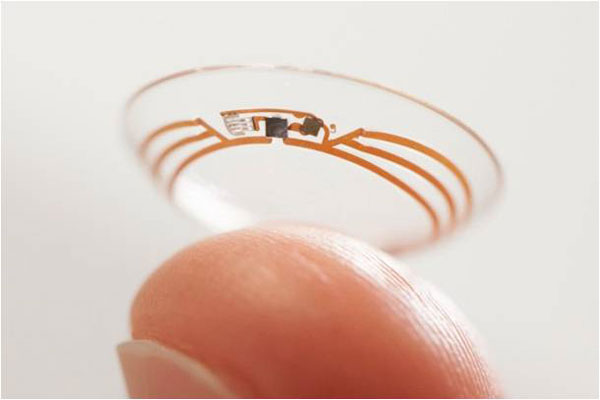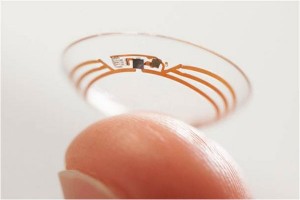
Some weeks ago, I came into the living room and met a cousin of mine who was using my laptop to do some research for school project only to notice that she looked a little bit disturbed. And when ask what the problem was she said “Uncle D, these people are insane”. And the next thing she blurted out was “would you like to have a smart lens in your eyes?” In confusion I asked her, why would I want to do that? Then she stood up from where the laptop was and said “please ask Google!” she shrugged and walked away. With this curiosity, I went straight to view what she was doing on the system, and before I could see anything, she turned around and retorted “they are playing God”, before heading straight for the kitchen. As my nature is, I smiled. This prompted my own research into Google’s latest patents even though I was aware of their novel release this year – Google glass.
I found out that Google is actually working on two unique smart contact lenses lately, which will have biometric sensing capabilities – one specifically targeted at people with diabetic issues and the other is with an embedded camera. “We’re testing prototypes that can generate a reading once per second,” Google’s Brian Otis and Babak Parviz said when announcing the project.
Earlier in the year, they came out with an invention of a smart contact lens of medical importance. The smart lens can be regarded as medical device of some sort as it is engendered towards tackling the growing and complex medical problem of diabetes, which is ravaging the world. Statistics has it that one out of every nineteen persons on the surface of the earth is battling with the disease. It is however interesting to note here, that this lens includes ophthalmic electrochemical sensors that have the capacity to detect tear droplets in the eyes of whoever is wearing it. And on detection a signal is sent to the embedded Light emitting diode which measures the blood sugar safety levels according to the company.

However, as stated in the second paragraph above, apart from the one with diabetic application there is currently a smart contact lens invention fitted with an in-built camera that is controlled by the blinking of the eyes of the wearer as explained by Google. The camera is built to follow your gaze i.e. wherever you turn your face to, since it’s in your eyes, it follows as it is designed to detect movement. The lenses were developed in the Google X lab and a patent filing dating of 2012, which was recently published by the US Patent and Trademark Office. The patent filing features a smart contact lens that includes an in-built circuit, camera and sensor and the control circuit has the capability of linking wirelessly or via a wire to the camera and sensor. This could really make the wearer live out the dream “science fiction” lifestyle.

Now all these things got me thinking of the many applications of these awesome inventions by Google, and as well as the skepticism that will trail its invention especially with people on my side of the planet earth – Africa, notably Nigeria. Your guess is as good as mine. They would intentionally mug the idea that anyone could even think of doing such things, mainly first, because of our religious inclinations and then resistance to anything new. Many questions may arise, like are there no medical implications involved? Can it work in an environment such as ours, where ICT infrastructure and power are still a challenge? But let’s look at the brighter side, for instance you may not know or understand what the people who are suffering from diabetes go through but if you have a firsthand experience whether personally or otherwise you would realize that it’s really a pain to keep up with the control of blood sugar levels. So with a medical device like that in place, people will no longer worry all day about the regulation of their blood sugar levels. Additionally, the smart contact camera lens for example will be a boon for anyone who is visually impaired and could probably be a very wonderful tool for the police too: in their fight against crime, and even more importantly on the war on terrorism. I can’t wait to see the plethora of uses that this inventions hold for mankind!
About the author: Douglas Omoruyi is interested in Managing values and beliefs, Entrepreneurship strategies, Science and technology, and Travels and tours. He can be followed on twitter @douglasomo



